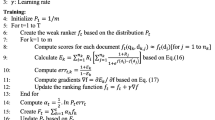Abstract
Relational Aggregated Search (RAS) is a paradigm that refers to a set of techniques for retrieving and aggregating information nuggets based on their relationships. The performance of a relational aggregated search is dedicated to how to retrieve an information nugget, and, how to present this information to users to fulfill their information need. Recent RAS research has focused only on information retrieval strategies. As consequence, there is a critical need to research strategies for aggregating and ranking information nuggets. In this paper, we focus on the recent issue, namely answering the question of how information is shown to the users. In addition, what are the most effective approaches for the ranking task? We use the ranked results from RAS. These ranked results include different content types (images, videos, news, maps, blogs, groups, and books, etc.). Thus, the focal challenge in the vertical results aggregation task is how to rank these heterogeneous results to obtain pertinent information. Our experimental results of the application of learning to rank algorithms and interleaving methods are shown in this study. From the evaluation results, we can affirm that LambdaMART proves its performance compared with the other; LambdaRank, MART, ListNet, and RankNet. Finally, we apply the interleaving approaches to satisfy the user's need by providing appropriate, organized, and most relevant results. Our experimental study proves that VI-TDA performs better than TDA in all steps of our tests.
Access this chapter
Tax calculation will be finalised at checkout
Purchases are for personal use only
Similar content being viewed by others
References
Kopliku, A., Pinel-Sauvagnat, K., Boughanem, M.: Aggregated search: a new information retrieval paradigm. ACM Comput. Surv. 46(3), 1–31 (2014). https://doi.org/10.1145/2523817
Lalmas, M.: Aggregated search. In: Melucci, M., Baeza-Yates, R. (eds.) Advanced Topics in Information Retrieval. The Information Retrieval Series, vol. 33, pp. 109–123. Springer, Heidelberg (2011). https://doi.org/10.1007/978-3-642-20946-8_5
Kopliku, A.: Approaches to implement and evaluate aggregated search. Ph.D. thesis, Université de Toulouse, Université Toulouse III-Paul Sabatier (2011)
Shokouhi, M., Si, L.: Federated search. FNT Inf. Retrieval 5(1), 1–102 (2011). https://doi.org/10.1561/1500000010
Yan, L.T.: Learning to Rank for Information Retrieval. Microsoft Research Asia, Sigma Center, Beijing (2009)
Arguello, J., Diaz, F., Callan, J.: Learning to aggregate vertical results into web search results. In: Proceedings of the 20th ACM International Conference on Information and Knowledge Management - CIKM 2011, Glasgow, Scotland, UK, p. 201 (2011). https://doi.org/10.1145/2063576.2063611
Li, H.: Learning to rank for information retrieval and natural language processing. Synth. Lect. Hum. Lang. Technol. 4(1), 1–113 (2011). https://doi.org/10.2200/S00348ED1V01Y201104HLT012
Liu, T.-Y.: Learning to rank for information retrieval. FNT Inf. Retrieval 3(3), 225–331 (2007). https://doi.org/10.1561/1500000016
Burges, C.J.C.: From RankNet to LambdaRank to LambdaMART: an overview, 19 (2010)
Burges, C., et al.: Learning to rank using gradient descent. In: Proceedings of the 22nd International Conference on Machine Learning - ICML 2005, Bonn, Germany, pp. 89–96 (2005). https://doi.org/10.1145/1102351.1102363
Ding, R.: Literature survey for Learning to rank. Computer and Information Science Department University of Delaware, p. 6 (2009)
Marek Modrý, Bc.: Learning to rank algorithms. Ph.D. thesis, Faculty of Electrical Engineering, Department of Cybernetics, Czech Technical University in Prague (2014)
Lasri, S., Nfaoui, E.H.: Aggregated search and interleaving methods: a survey. In: Proceedings of the International Conference on Big Data and Advanced Wireless Technologies - BDAW 2016, Blagoevgrad, Bulgaria, pp. 1–9 (2016). https://doi.org/10.1145/3010089.3010098
Kharitonov, E., Macdonald, C., Serdyukov, P., Ounis, I.: Generalized team draft interleaving. In: Proceedings of the 24th ACM International on Conference on Information and Knowledge Management, Melbourne Australia, October 2015, pp. 773–782 (2015). https://doi.org/10.1145/2806416.2806477
Chuklin, A., Schuth, A., Hofmann, K., Serdyukov, P., de Rijke, M.: Evaluating aggregated search using interleaving. In: Proceedings of the 22nd ACM International Conference on Information and Knowledge Management - CIKM 2013, San Francisco, California, USA, pp. 669–678 (2013). https://doi.org/10.1145/2505515.2505698
Achsas, S., Nfaoui, E.H.: Improving relational aggregated search from big data sources using stacked autoencoders. Cogn. Syst. Res. 51, 61–71 (2018). https://doi.org/10.1016/j.cogsys.2018.05.002
Zhou, K., Lalmas, M., Sakai, T., Cummins, R., Jose, J.M.: On the reliability and intuitiveness of aggregated search metrics. In: Proceedings of the 22nd ACM International Conference on Information and Knowledge Management - CIKM 2013, San Francisco, California, USA, pp. 689–698 (2013). https://doi.org/10.1145/2505515.2505691
Schuth, A., Hofmann, K., Radlinski, F.: Predicting search satisfaction metrics with interleaved comparisons. In: Proceedings of the 38th International ACM SIGIR Conference on Research and Development in Information Retrieval, Santiago Chile, August 2015, pp. 463–472 (2015). https://doi.org/10.1145/2766462.2767695
Author information
Authors and Affiliations
Corresponding author
Editor information
Editors and Affiliations
Rights and permissions
Copyright information
© 2022 The Author(s), under exclusive license to Springer Nature Switzerland AG
About this paper
Cite this paper
Lasri, S., Nfaoui, E.H. (2022). Ranking Task in RAS: A Comparative Study of Learning to Rank Algorithms and Interleaving Methods. In: Motahhir, S., Bossoufi, B. (eds) Digital Technologies and Applications. ICDTA 2022. Lecture Notes in Networks and Systems, vol 454. Springer, Cham. https://doi.org/10.1007/978-3-031-01942-5_16
Download citation
DOI: https://doi.org/10.1007/978-3-031-01942-5_16
Published:
Publisher Name: Springer, Cham
Print ISBN: 978-3-031-01941-8
Online ISBN: 978-3-031-01942-5
eBook Packages: Intelligent Technologies and RoboticsIntelligent Technologies and Robotics (R0)




